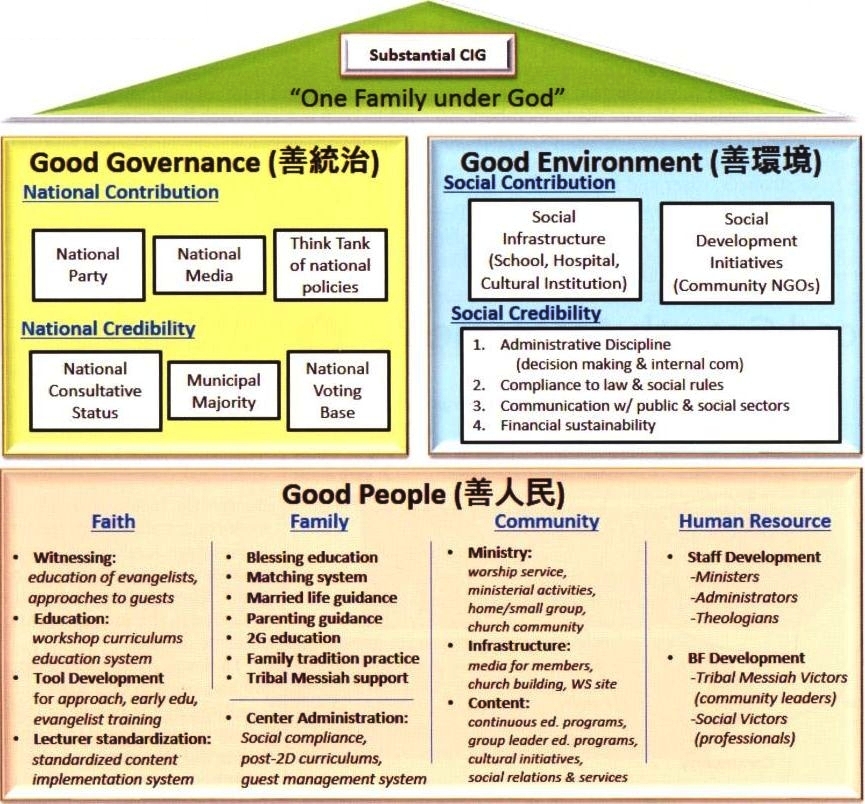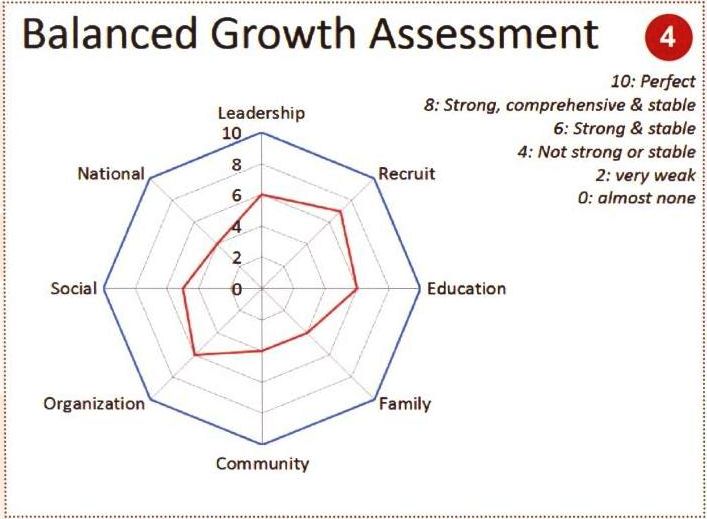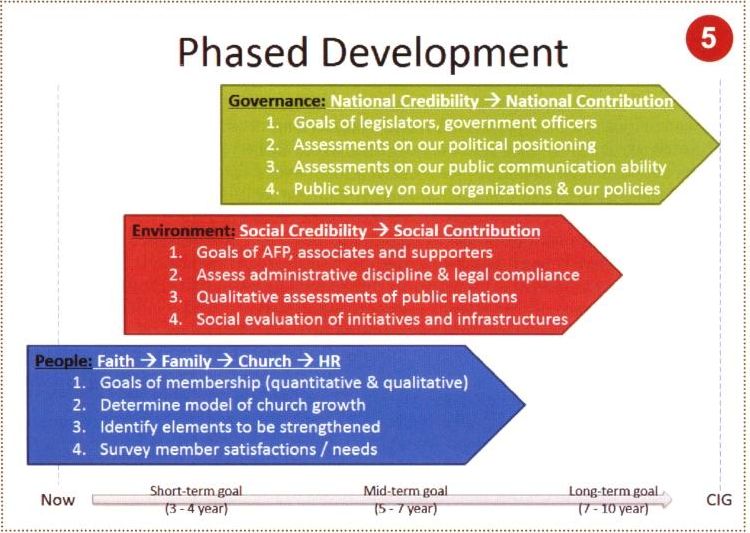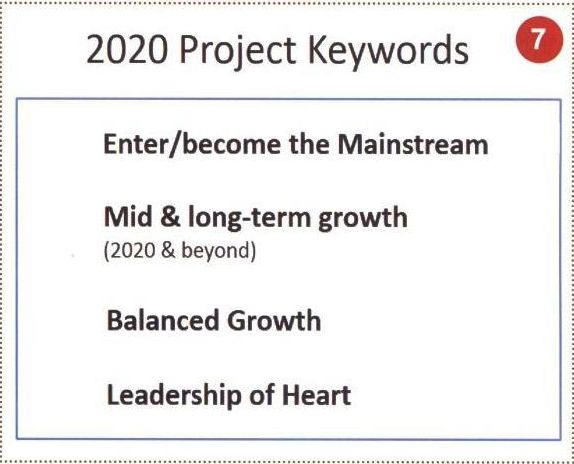![]()
The Words of the Nagasaka Family
|
|
The Words of the Nagasaka Family |

Elements
of Cheon Il Guk
Since we have covered the perspective of the development of growth through stages, I would like to move on to another perspective, which is that of components and elements of growth. A nation is often said to require three components; namely, government, territory and people. In order to make Cheon Il Guk or a nation of peace, we can say that our initiatives in our countries should be composed of those that develop good governance a good environment and good people. We in the international headquarters tried to break the components down into smaller elements. (See diagram 3) This model is a work in progress, and is an attempt to give you an overview of the elements we need to pay attention to.
Since I wanted to have some consistency with the previous concepts of development, I categorized our elements for good governance as national contribution and national credibility. If we want to make any contribution for the betterment of the governance of our country, we may need a think tank to come up with relevant analysis and proposals, a media outlet that can communicate those to the people of the nation, and some kind of a political arm to help the implementation of those ideas.
However, before we think of applying our ideas, we should first build some credibility in the realm of governance. In Taiwan, there is a consultative committee of religious organizations that serves the government, of which our national leaders have continuously been included as a member. This shows that we have certain national credibility; in other words, we have started to enter the mainstream. I have already mentioned about the municipal presence of the Mormons in the state of Utah as an example. Also, we are now seeing a growth of our national voting base in Nepal. These are examples of emergence of national credibility.
Society, a realm where people live, can be a synonym for "environment." Similar to the good governance, I categorized it into social contribution and social credibility. Under social contribution, I separated the social infrastructure as being a more stable and sustaining contribution in comparison to other social development initiatives that require less commitment. In the same manner as above, as we work on our contribution, we must secure our credibility. I have listed some of the minimal requirements in building such credibility within the society. It goes without saying that these elements are required as we build the elements of good governance, but all these elements and foundations must be supported by the foundation of people.
As we all say, "first things first"; we need to secure and enhance our people. Here, I categorized what we should pay attention to into four major areas. One is the area of faith growth, such as witnessing and education. The second is family, which is not just about the Blessing Ceremonies, but about important programs such as those for after starting a family, married life, having children, the intricacies of parenting and of course education of the second-generation -- add to that a system to manage all of these. Then comes the area of building our church community. We need to think of a type and quality of ministry our church leaders engage in, what kind of infrastructure we have, such as media for members, and church buildings and training sites that can support our community. Areas such as education for group leaders and choir development can also be included. Last is the area of human resources. I identified two categories for human resources we must develop. One is raising fulltime members, as ministers, administrators or theologians. Sometimes we have geniuses that can work in all those areas, but then again, often we have good theologians that are not good administrators, good ministers that are not cut out for theological debates, or someone who may not be a great minister or theologian but can become a great administrator or specialist of some type. I think we should accept that not everyone can become an almighty leader, but everyone can become valuable to the organization if we pay attention to their talents and train them according to their qualities.
The other area of FIR is developing victors out of blessed members that are more integrated in society, especially to support them to become victorious tribal messiahs or leaders of communities, as well as excellent and respected professionals.
All these ideas are not new to you, I am sure. As I said, these are from what I heard and learned from our leaders and elders in world missions. I am just laying the components and elements out. What I wanted to stress was the importance of balanced growth. Please ask yourselves, how is the balance in your organizations? What is missing and what is being overinvested into, compared to the other elements? Which elements are urgent? After asking these questions, please think of what you want to maintain or add focus to in the next two to three years. You don't have to do everything at the same time, but I recommend working on the elements starting from the area of people; that is, from faith, family, community and human resources and then work your way through social credibility, social contribution, and finally the national elements.

In order to make an assessment of balanced growth, I pointed out eight major areas in which we should evaluate the potentiality of the field -- leadership, recruits (or witnessing), education, family, community, organization, social and national. (See diagram 4) I have listed checking points for each area. (For details, please refer to the separate handout that lists checking points for each area.) For example, the checking points for leadership are not about the ability of the top leaders, but questions such as: Whether the national leader is indigenous or has local citizenship, whether candidates for the next national leader exist and whether you have a system of developing mid-level leaders and Divine Principle lecturers. Without a good leadership base in terms of quality and sustainability, we cannot have growth or maintain it. With a good recruiting foundation, your mission may hold promise for success for at least a few years. But without a good education foundation to raise people and keep them, your membership may be depleted. Likewise, if you do not have various programs to enrich family life, or to build good church communities that bind our families together, even after working hard at witnessing and workshops, you may be left with the same number or even fewer members after several years. Furthermore, if you are looking for long, stable growth, you need to look into the quality of the organization, its administration, and your engagement with the society and the nation.
Typically, we receive many reports about witnessing, mobilization, events, workshop participation, meetings with prominent societal figures and appointments of ambassadors for peace. In other words, more reporting and evaluation is done of recruitment and education than of other areas. This may be because the recognition of results in those areas is easier to achieve, or results in those areas is can be gained comparatively faster.
You have already development knowhow and have invested much into those areas, so we encourage you to maintain those pursuits. Having said that, over the next few years, I would like to have the international headquarters add value to the mid- and long-term growth of world missions by focusing initiatives on the areas that are comparatively neglected and require attention; namely leadership, family development and organization.
I would like to discuss with all of you how we can strengthen leadership. For example, next February, we could have a workshop for national leaders -- not for everybody, but for those that require an enhanced comprehension of the basics of what a national leader should understand and do. Many leaders struggle in their mission, trying to maximize the limited resources and the training they have received. We can support them by giving them a chance to learn about different aspects of leadership and management on a national level. Even for those who already have a basic understanding, it is good to be reminded of the concepts and to upgrade their standards.
Family development is also a very important area that we want to invest our resources in. We lose many members, children, and active leaders through their struggles related to family issues. We want to learn how we can support our blessed families to be stronger, wiser and happier all across the regions of the world. We can also provide family programs to our ambassadors for peace. When they experience salvation in their marriages and families, they will become more committed and be part of us in heart and for life. They would not be looking for any other benefits. I would like to work with Family Department heads and leaders of family programs in different countries to hold functions where we could come together and start creating an international inter-regional environment to empower family support. Korea, Japan, Europe and the U.S. have produced good materials after many years of trial and error. I believe that the newly emerged mission nations do not need to go through the same processes of losses and pain, if we only share our resources, our experiences and knowhow. I hope that we can install a person in our office to support these functions.
Lastly, we would like to find ways to support our churches to enhance their administration and organization discipline and skills. The improvement in this area is not easily recognized or often dismissed, but accumulation of such small and less visible improvements prevents risks, loss and problems and supports efficient growth.
As I was asked to assess the nations and make strategic recommendations in light of Vision 2020, I went through various reports and listened to information and opinions. I realized that there are a few points that I need to bear in mind as we try to evaluate and assess our situation.
One is the quantity and quality of the numerical reports. When we deal with numerical reports, we look at the quantitative. But we also need to assess the quality or significance of the numbers -- the specific definitions of what was measured, and the accuracy or adequacy of the manner of measurement.
Next is the organic balance, as I mentioned above, seeing the balance in growth. Overdevelopment in one area could be unhealthy or even detrimental or harmful to another.
The last is the importance of survey research. We want the perspectives and input of as many different people as we can get to keep our approach becoming overly subjective or our response becoming self-satisfied. Abel cannot bring 'victory by being in a world his own. In the end, Abel's victory is determined through recognition by and appreciation from Cain. By "survey research," I am specifically referring to practices used in marketing research and customer satisfaction inquiries. This includes analyzing the inflow and retention of new members, having a membership database to increase our understanding of members' situations, creating a system where members can report problems and dissatisfaction, or doing a regular survey of membership satisfaction or happiness. Japan is comparatively good at these; they have very good databases and reporting systems to analyze the health of different churches.
They have a designated e-mail address and fax number to which members can directly contact the headquarters to ask questions, seek consultation or to report misdeeds. The Japan church also conducts a national survey on membership happiness about every two years. The input from all of these methods is reflected in the management of organizations to some degree.
To develop our social engagement levels, we also need to find ways to measure the recognition, by the people outside of our church, of our organizations, initiatives and pursuits. Korea did this once and although there are arguments over the validity of the research, the outcomes were very insightful.
All these initiatives are not easy and may consume resources of effort, time and money. They may not create quick results, but if we are serious about our goals and efficiently getting there, these should be looked into, encouraged and supported.

As we went through the basic consensus of the vision, mission, road map and the components and elements of the project, we should spend time on building relevant goals. One of the keywords of Vision 2020 is "Mid-term and Long-term growth." Here mid-term means five to seven years and long-term can mean ten or more years. In other words, 2020 is mid-term, and beyond that is the long-term. Based on our experience, we do not believe that the world is going to end, or that everything will perfect by 2020. Whatever we accomplish by that time, will be for the sake of greater developments afterward. We also do not need to think that we have to accomplish everything at once. My proposal here is to design phased development. (See Diagram 5)
The first phase involves focusing on building sustainable growth in the "people" component, starting from faith, family, church community and human resources. You should begin focusing on this immediately if you have not done so already.
I recommend setting various goals. One set of goals is obvious, numerical membership goals of different types. The second is goals for the model of church that you want to grow into as seen in the church growth process. (See Part 0 This calls for changing the form or quality of the container that is to hold your targeted membership size. Following that comes the identification of elements to strengthen and the methods to improve. The final step involves conducting a survey of membership satisfaction and happiness or the needs and goals to improve in those areas.
If you have some confidence from the first phase, you may start initiatives in the second phase, which covers the environment. I was often told to work on changing the "image of our church" or to do "good PR." I felt uncomfortable every time I heard it, because these days, image is closely connected, in fact, completely inseparable, from the actual substance. Public relations or communications can work only if we have something to relate or communicate.
As Father said, the purpose of the word is substance, and the purpose of substance is heart; the world is increasingly becoming keen to know the deeds and motivation of an organization and less and less trusts what it tries to advertise. I believe that before we talk about changing our image or doing good PR, we should be talking about building social credibility and making a social contribution, which will result in building quality public relations and an improved image.
Here, of course, we should have a set of goals for ambassadors for peace, associates or supporters. But we should have goals regarding how to improve our administrative discipline, legal compliance and financial health and sustainability. When we pursue public relations or develop contacts, we should be assessing the contact's qualities, such as at what level they actually operate, and the depth of commitment in the relationship. Lastly, we should find a way to gauge how society evaluates or appreciates our initiatives and infrastructure, and then set relevant goals.
Finally, based on the foundations related to "people" and "the environment," we may start setting goals for the betterment of national governance. There can be numerical goals of politicians and bureaucrats that we want to raise or support, but more to the point, we need to assess how we want to position ourselves politically. In order to accomplish our goals safely, we would need to have assessments on the ability of our institutions and their public communications. Finally, we must measure how the public sees our organizations and the policies we propose.
As I mentioned above, you do not need to start every initiative at the same time, but start to ponder what you may be working on in the near future as you invest in the current focuses of your work. What I am proposing here is to have a broader view of phased development and try to figure out the right timing when shift gears, changing focus and pursuing new goals.
I would like to share some of the values that I appreciate when I see those who lead and manage our organizations. The most important value that I appreciate is the leadership of "heart," how a leader or manager cares about Heaven, the mission, our people, the society and the world. As I stressed in the beginning, our work should not be about showing off or winning a power game, but about how we genuinely love Heaven, love people, love the nation and try to improve their circumstances.
True Mother often mentions this lately. Our church used to be called a church of tears. Perhaps we may have forgotten how to care, share and cry for others, as Pope Francis has said of his church. In order to appreciate a leader's passions, I usually ask leaders why they love their mission country and how they understand God's love and heart toward that mission country. I also ask what the problems or pains of that country are and how we can contribute to their solution, so that I can understand the depth and relevancy of their passions. Without genuine passion, our purposes are already defeated from the start.
What I also appreciate in leaders is their intelligence and professionalism. Being intelligent or systematic and logical, keen on information and strategic insights, makes a big difference. Being intelligent enough to appreciate the skills and intelligence of others is also important. What could debate what professionalism means, but we should move away from our amateur ways, learn discipline in our work, and have the identity that we are professionals in what we do. Intelligence and professionalism so that our passions explode in the right direction toward the right opportunities and so those passions can penetrate but not destroy.
Finally, I would like to touch on the missions of strategic, providential and general mission nations, and the differentiation between UPF and FFWPU goals and functions.
When we look at our foundations worldwide, we can see that our strength in making changes in the world has been our international presence; we exist in almost every country. Based on that, we built our world providence with the goals such as an "Abel UN" and global good governance driven by UPF. Our network of ambassadors for peace is impressive. I believe that all nations, especially the strategic and providential nations, should invest in reinforcing our international presence. Strategies for approaching international pursuits and alliances should be provided by the UPF international office, which has the specialists and professionals in that arena.
On the other hand, however, our national presence has been our weakness: in every country, our foundation is neither stable nor impressive. That is why Vision 2020 focuses on the strategic nations, which we believe have great potential to enhance their presence nationally. Our focus in the FFWPU International Headquarters for Vision 2020 is to help build national strategies that drive toward the goal of substantiating Cheon Il Guk or at a minimum entering the mainstream in all those strategic countries. Our communities of Blessed Central Families must become impressive.
That is the focus of the strategic nations, while providential nations should support the strategic nations in their endeavors. Other mission nations can connect to the providential and strategic nations, and focus on their basic growth, so that they can rise to take on higher missions and roles in the near future.

What I have mentioned here is nothing new. I do not claim to have invented these ideas. On the contrary, this is the result of learning through hearing and observing our leaders and organizations.
I intended to confirm our consensus and build some kind of framework, so that it will be easier to set goals and assess outcomes. As you can see, the keywords of our vision 2020 project are "becoming or entering the mainstream," "balanced growth," "mid- and long-term growth" (that is, growth to be achieved by 2020 and beyond 2020) and "leadership of heart." True Mother recently spoke about rebuilding the community of heart, caring for members and those in our second generation. Looking back, True Father genuinely cared about people be they our members, Korean citizens, Christians and people under communism and so on. I firmly believe that caring for our members and for our neighbors are the fundamentals of our identity and the basis for all our successes. Our job as leaders is to translate our love, heart, revelations and inspirations into initiatives and systems that are relevant to the lives of our members as well as our neighbors in our respective countries and mission areas. We stand on the historical foundation of the sincerity expressed by God, True Parents and all our predecessors. Let us move forward with life-or-death determination and provide a substantial offering to Heaven within the next six years.